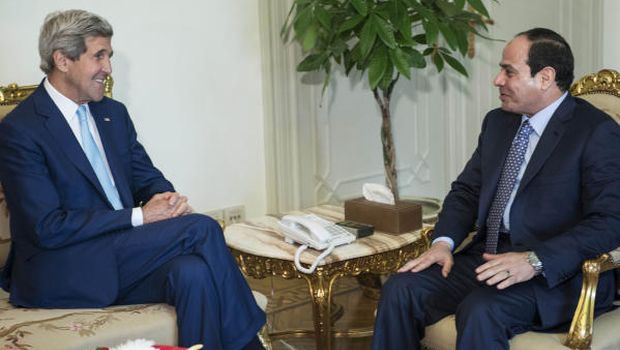
US Secretary of State John Kerry, left, talks with Egypt’s President Abdel Fattah El-Sissi before a meeting at the presidential palace in Cairo, Egypt, on Sunday, June 22, 2014. (AP Photo/Brendan Smialowski, Pool)
Cairo, Asharq Al-Awsat—US Secretary of State John Kerry held meetings on Sunday in Cairo with Egyptian President Abdel-Fattah El-Sisi, and Arab League chief Nabil Elaraby, before leaving for Jordan, with the Iraq crisis featuring prominently among the discussions.
In a joint news conference with Egyptian Foreign Minister Sameh Shoukry, Kerry said it was essential to disrupt any attempts to provide funds or support to terrorist organizations such as the Islamic State of Iraq and Syria (ISIS).
Speaking of Egypt, Kerry said: “As President Obama told President Sisi after his inauguration, we are committed to working together to fulfill the full promise of Egypt’s 2011 revolution, and to support the political and economic and social aspirations of the Egyptian people as well as their universal human rights.”
Kerry added that most of the 650 million US dollars in aid to Egypt—suspended since the ouster of Islamist president Mohamed Mursi last July—had now been released, and that in future this amount would be increased to 1.5 billion dollars.
He also said the delivery of a delayed batch of Apache attack helicopters to Egypt would also be going ahead. “The Apaches will come, and they’ll come very, very soon,” the US secretary of state said during the press conference.
Kerry said he discussed the country’s economic challenges with Sisi, reiterating that the US will support the rights and liberties of all Egyptians, including the freedom of expression and peaceful assembly, and the rule of law.
Official spokesman for the Egyptian presidency Ihab Badawi said Kerry confirmed during the meeting the US’s commitment to its “strategic” relations with Egypt, and that his country was committed to providing economic and political support to Egypt.
Badawi said the Egyptian president confirmed his commitment to meet the aspirations of the Egyptian people as soon as possible, in response to the confidence shown in him by the public. He said the election of parliament would be a main step on the way to completing the legislative structures that would “enable the constitution’s articles to become laws and binding rules,” especially in relation to individual rights and freedoms.
Badawi said everyone agreed “on the importance of security coordination between Egypt, the US and other concerned countries in the region, in order to achieve stability and security in the region, and ensure the safety of its people.”
Meanwhile, Egyptian Foreign Minister Shoukry said Egypt always strived for “the stability and unity of Iraq and the security and unity of the Middle East.” He added that Sisi and Kerry had “discussed various regional and international issues of mutual interest.”
Shoukry said Sisi and Kerry agreed on the importance of unifying efforts to confront the challenges and dangers in the region, and the impacts they have on regional and international peace and security, especially the dangerous unrest in Libya, Syria and Iraq, in addition to the faltering Israeli–Palestinian peace process.
Shoukry added that Sisi’s meeting with Kerry “embodied Egypt’s commitment to bolstering bilateral relations between the two countries and removing obstacles which prevented their development.” He added that Kerry “stressed the importance of US–Egyptian relations and their strategic dimension, as well as the need to take them to greater heights.”
Meanwhile, foreign diplomatic sources, speaking on condition of anonymity, told Asharq Al-Awsat that the aim of Kerry’s visit to Egypt and the region revolved around the complicated situation in Iraq.
They added that Kerry hoped to find a solution for the problem with the help of Arab and Egyptian parties, because what was happening in Iraq was negatively affecting the region and neighboring states.
The sources added that Washington was deeply concerned by developments in Iraq and that it was unsatisfied by the policies of Iraqi Prime Minister Nuri Al-Maliki, and that Washington was hopeful Iraqis could “form a national unity government in which all Iraqis are represented, in order to disrupt the plans of extremists.”
